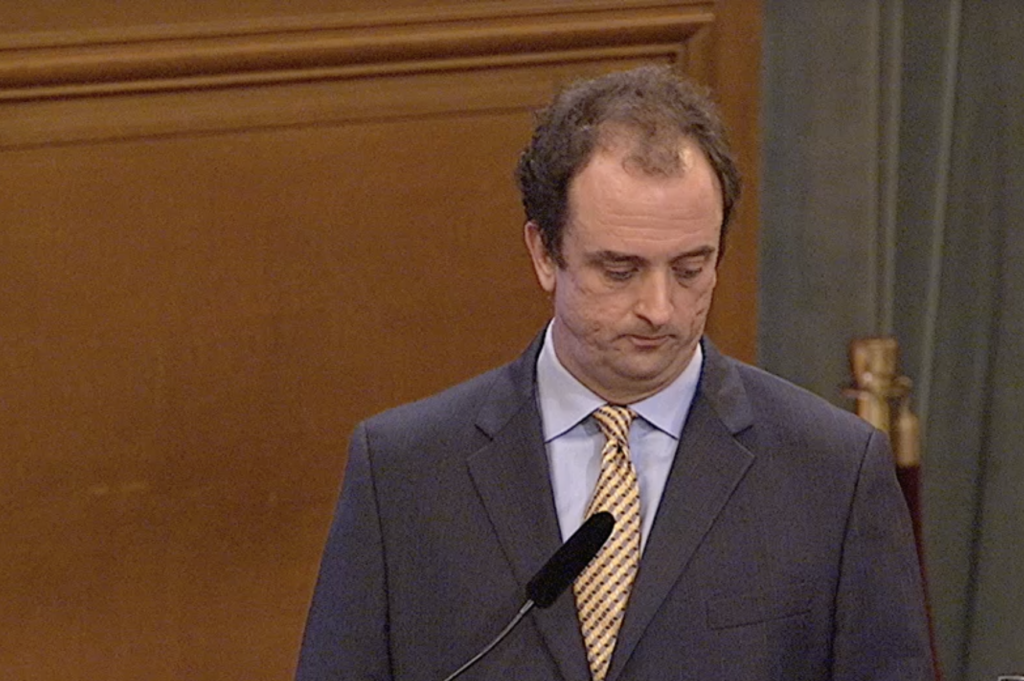There is really only one way to interpret the information that came out of an unusual and sometimes stunning hearing yesterday on the mayor’s demands for undated resignation letters from commissioners:
Mayor London Breed has gone beyond the normal practice of appointing commissioners who agree in general with her agenda and is directly trying to micromanage, pressure, and control the supposedly independent public officials.

Breed didn’t attend the hearing, called by Sups. Dean Preston and Hillary Ronen, but her chief of staff, former Sup. Sean Elsbernd, did. Preston, Ronen, and Sup. Connie Chan asked Elsbernd a long list of questions; like the skilled lawyer and politician he is, Elsbernd tried his best to duck the difficult ones.
He said, for example, that the policy of demanding resignation letters came directly from Breed, and he refused to disclose whether he had advised her against the policy or whether she had discussed it with the City Attorney’s Office, which now says what she did was not consistent with the City Charter.
Breed has since abandoned the practice (although there is no indication at this point that she has destroyed the existing letters).
But Elsbernd said that the decision to ask for the letters was entirely at the mayor’s discretion; only 40 of the more than 400 commissioners she appoints were asked to sign one.
Some of those were on very key panels; all four of her appointees to the Planning Commission signed the letter, and she asked two of her Police Commission appointees, Debra Walker and Max Carter-Oberstone, to submit them.
Carter-Oberstone, who rescinded his letter and helped blow the whistle on the practice, was at the hearing.
Elsbernd insisted that the letters were voluntary, that nobody was ever told that their appointment to a commission was dependent on their submission of a resignation letter.
Carter-Oberstone provided specific evidence to the contrary. He said that the mayor’s appointments director, Tyra Fennell, specifically told him that his re-appointment to the Police Commission would go forward only if he promised to submit the letter.
Fennell, he said, “made clear that I had to sign it.”
He also said that Fennell had indicated that all city commissioners appointed by the mayor had to sign resignation letters, although only about one in ten actually did.
The fact that he was directed to sign, he said, “can only be understood as an end run around the City Charter to shield the mayor from accountability.”
The City Charter makes clear that commissioners appointed by the mayor can only be removed for good cause, and that the Ethics Commission and the Board of Supes have to approve the removal.
Elsbernd admitted that the Charter was clear on this point, but said that the process was too long and difficult, so the mayor wanted a way to make changes quickly.
Elsbernd insisted repeatedly that the letters were only on file in the case of serious misconduct; he mentioned the case of Mel Murphy, who refused to resign for months from the Port Commission even after the city attorney began investigating his business practices.
But testimony from Carter-Oberstone and from Elsbernd made clear that the policy went beyond just the highly unusual case of a commissioner under an ethics cloud who refuses to step down.
“That’s not how this works,” Carter-Oberstone said. “Everyone knows that this letter can be activated without notice.”
In his case, senior staffers in the Mayor’s Office were furious that he refused to support Breed’s candidate for president of the Police Commission and that he refused to try to delay a process that would lead to limits on police officers using pretext stops to hassle people of color who were driving cars.
Seriously: A senior staffer in the Mayor’s Office called a Police Commission member and told him to make an “impassioned speech” undermining a plan that the commissioner not only supported but had made a top priority. And according to Carter-Oberstone, that staffer told him that if he refused there would be “serious consequences.”
He took that to mean that his resignation letter would be invoked.
Carter-Oberstone offered sound and credible policy reasons why he supported Cindy Elias, not Breed’s choice, for commission president, and why he thought she was not only more qualified but would work with him to end pretext stops.
Breed’s candidate, Larry Yee, he said, might use his power to delay or crater the entire policy.
Ronen noted that it’s normal for mayors to appoint commissioners who generally agree with their policies. “It’s another thing to pressure and attack a commissioner” over policy differences, she said.
Preston asked Elsbernd if he thought it would be appropriate for a member of a commission, who was hiring a director for the department, to demand an undated resignation letter. He agreed that it would. In fact, Preston said, a commissioner who took that step might be guilty of official misconduct, which could warrant removal from office.
“The only person not subject to removal under the Charter is the mayor,” he said.
Elsbernd insisted repeatedly that Breed would never use the threat of a resignation letter to settle a policy disagreement. But the letters were open-ended, and there’s no reason she couldn’t or wouldn’t do that. In fact, in the Police Commission case, there’s substantial evidence that here staff threatened to use a resignation letter to force a member to change his policy position.
And in other places, that has become a problem.
In a KQED interview, Breed said that she wanted to have “a level of control” over her commissioners, since she’s the one who is held accountable for what they do.
Elsbernd’s assertion that none of this would ever involve threats to commissioners over policy requires us to believe that Breed only acts in the public interest, and is not vindictive, and would never try to force one of her appointees to do what she wanted.






